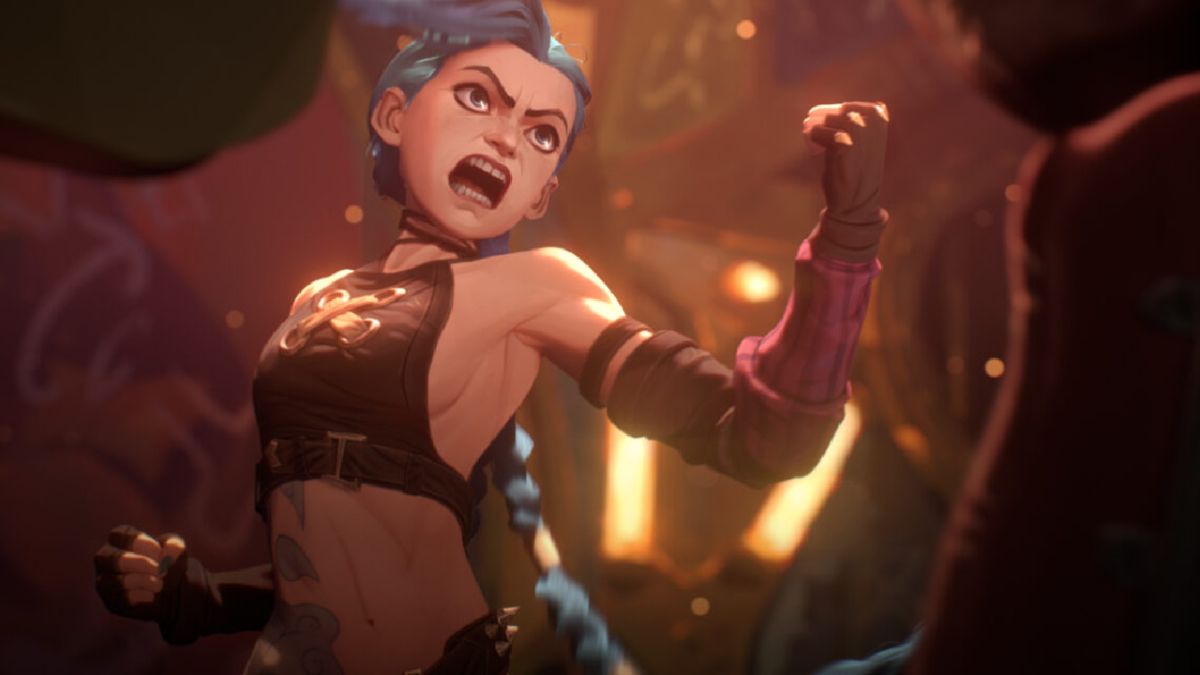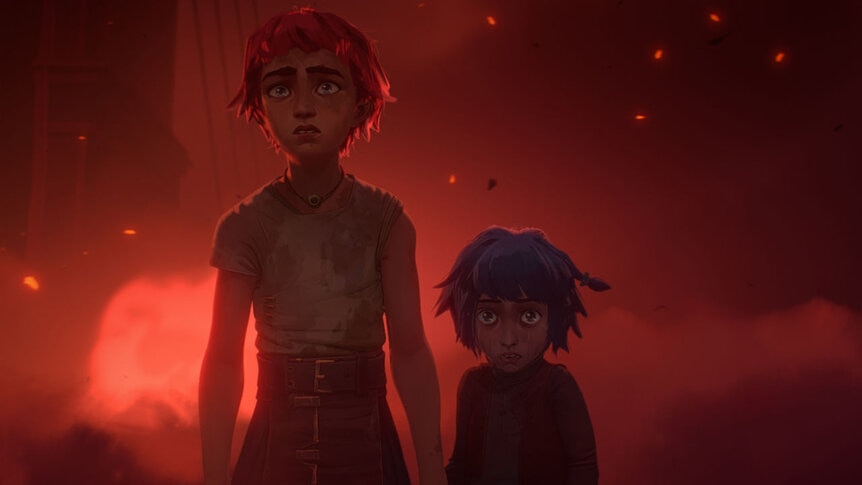Create a free profile to get unlimited access to exclusive videos, sweepstakes, and more!
Why 'Arcane' is one of the most progressive animated series out there
Arcane is breaking storytelling and visual boundaries.

In November of 2021, Arcane, the original animated series from Riot Games, quietly slipped onto Netflix and knocked the proverbial socks off of audiences around the globe. The series was based on League of Legends, the insanely popular online battle arena game, so players of the game certainly knew that the show would celebrate a decade of the online game's world-building. But, those outside of gaming circles were certainly less aware of Arcane, or just plain uninterested in partaking because of the game's often negative reputation for some of its toxic players.
As a first entry into the property, many were impressed by its lush trailer featuring a distinct, painterly style developed by French animation studio Fortiche. The curious were richly rewarded. As scripted by series creators and long-time Riot Games League of Legends creatives, Christian Linke and Alex Yee, Arcane is in a class above the typical adaptation of a video game for television. Not only is it visually spectacular, there's A-level voice acting by the likes of Hailee Steinfeld (Hawkeye) and Ella Purnell (Yellowjackets), and the caliber of storytelling that is frankly way beyond what anyone might expect even for live action storytelling.
Linke and Yee were invested architects who had been building this world and characters that serve as the settings for the League of Legends gaming events and storylines, and they were, intent in making a series that would not only fill in the gaps about playable characters from the game, but also make anyone watching their stories care about them. As such, they plucked two extremely popular playable characters, Vi (Steinfeld) and Jinx (Purnell), and made them the emotional cornerstones of Season 1's nine-episode arc.
The series gives the pair an actual origin story that is only softly alluded to in the games. The first season's narrative clarifies that they are sisters who lost their parents as kids and were raised by a foster father, Vander (JB Blanc) in the poverty-ridden city of Zaun. Teen Vi navigates the streets with her small crew, and begrudgingly allows her younger sister, Powder, to learn the ropes alongside them. Vi only lets Powder join her because both are still reeling from the loss of their parents, and it's that bond that serves as the emotional spine of the series.
It's when a typical robbery mission in the rich city of Piltover goes bad that a string of cascading events puts Vander in jeopardy for protecting them. His fate creates an unintentional, but devastating rift between the sisters that lays the groundwork for layers of story work that ventures into some heady territory, including the impact of unaddressed trauma, long-term mental health issues, the processing of guilt and forgiveness, and the tragedy of loss.
In particular, Vi and Jinx's stories are especially potent because the expectation is that a video game series — one that specifically platforms the sisters on opposite sides of a lot of melees in the game world — would just pit them against one another and be done with it. More bad girls breaking things, feeding into destructive stereotypes reducing women into cat fighters and manipulators. Instead, the series takes incredible care to make nothing black and white about their relationship, both in their youth and then when they reunite as young women.
In the first three episodes of the series, Vi is the angry teen who takes out her lack of agency in the wake of her lost parents by lashing out at the rich people who live topside, stealing and fighting her way through the pain. But she's fiercely protective of Powder (who will eventually take the name Jinx) and understands the devastation of abandonment, so she tries to shield her little sister from experiencing more. Tragically, that unaddressed anger is also the undoing of the relationship she holds most dear when, in a fit of anger for something Powder did, she calls her a jinx and seemingly abandons her. Most shows would make that a black and white moment that creates a line in the sand between the girls and a reason for them to be enemies forever. However, Arcane goes deeper and uses that moment to illustrate the emotional consequences that can further break broken people. In Powder-turned-Jinx's case, Vi's burst of anger mixed with her guilt for her mistakes that cost lives cracks the little girl forever and makes her vulnerable and exploitable as it's seized upon by Zaun's would-be-grassroots savior known as Silco (Jason Spisak).
Uninterested in creating a tropey love triangle, Arcane instead creates an emotional triangle between Vi and Silco for the very soul of Jinx when she grows into a mentally unstable young woman. She's brilliant with gadgetry and inventions but she's also just as combustible as the bombs she makes. As her past mistakes literally haunt her fractured mind into her adulthood, there's an arrested development that Jinx clings to so she never gets past her “defining” moment. Silco is all too happy to raise her like his daughter, encouraging her intelligence and eccentricities, but also treating her like his most valued weapon which is as toxic as it gets. When Vi returns to Jinx's life, she tries to step back into her role as a moral compass and conduit to compassion for her troubled sister, but trying to resurrect Powder from the ashes of Jinx proves to be incredibly difficult.
Also to the show's credit, as the story arc unfolds Jinx is never reduced to just the “crazy” female villainess. The writers and Purnell do a tremendous amount of work in keeping Jinx on the edge, but always with restraint. She does some terrible things for Silco and because of her unaddressed emotional issues which spur feelings of intense jealousy and pettiness. But she was never really parented and that's made abundantly clear so there's an overwhelming mantle of tragedy that lays heavy upon Jinx that never devolves into shallow histrionics or over-the-top performance just because. The series makes it very clear that watching Jinx fall apart is awful because of all that she might have been in a different life, for the relationship she could have had with Vi and Silco if their own tragedies hadn't thrown them off course. And the series makes it clear that Silco loves Jinx for all that she is, flaws and all, which isn't something Vi can do as readily.
Arcane is the series just waiting for you to discover it. Yes, it will dazzle you with its gorgeous animation and thrilling execution. But even more, it's ready to take you on a mature, emotional ride that has tremendous wisdom about the complexity of people and the pain they carry with them.
Season 1 of Arcane is streaming on Netflix.



























